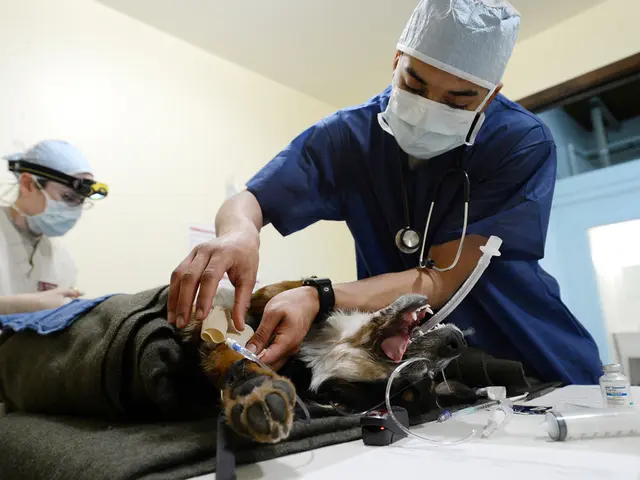Developed Vaccine for Protecting Dogs Against Rattlesnake Bites
The Rattlesnake Vaccine for dogs, developed to create protective antibodies against venom, has been a topic of debate in the veterinary community. This vaccine, designed to reduce pain and swelling after a snakebite, is considered a non-core vaccine and is recommended primarily for dogs living in areas with high rattlesnake populations or those at risk of exposure.
While the vaccine is used in practice to mitigate the effects of snakebites, the scientific community approaches its use with caution. Peer-reviewed studies supporting its efficacy may be limited, with much of the existing literature focusing on the basic mechanism of creating protective antibodies rather than comprehensive efficacy studies.
One of the key points to understand about the Rattlesnake Vaccine is that it provides no protection against bites from coral snakes, water moccasins, or the Mojave Rattlesnake. Even if your dog receives the vaccine, it will not make your dog immune to the snake venom. Instead, it may buy you some time to transport your dog to the veterinary hospital and lessen some symptoms.
It is important to note that there are no controlled studies proving the efficacy of the Rattlesnake Vaccine. A 2014 peer-reviewed study found that the vaccine did not provide any protection to dogs that had been bitten and required treatment with antivenom. Furthermore, a 2018 study suggests that the vaccine has been linked to anaphylaxis and lack of clinical protection in dogs who have been subsequently bitten by a rattlesnake.
The Rattlesnake Vaccine is monitored by the USDA and manufactured by one company, Red Rocks Biologics, based in Sacramento, California. It is critical to realize that the vaccine is only meant to protect against venom from the Western Diamondback Rattlesnake.
The cost of the vaccine varies and is set by the veterinary clinic, with prices ranging from $30-$50 per booster and possibly requiring an examination fee as well. The vaccine should be given at least 30 days before potential exposure to rattlesnakes, and twice-yearly boosters are recommended for dogs exposed to rattlesnakes for longer than 6 months.
Having your dog vaccinated with a Rattlesnake Vaccine is a personal decision that should be based on your veterinarian's recommendations. If your dog is routinely exposed to places where rattlesnakes live, the vaccine may be helpful, but this is a decision that should be made with the guidance of your local veterinarian.
It is essential to remember that anytime a dog is bitten, immediate emergency veterinary care is needed. A pet parent may develop a false sense of security after having their dog vaccinated with a Rattlesnake Vaccine and decide not to seek immediate veterinary care if their dog is bitten, resulting in suffering and possible death.
In conclusion, while the Rattlesnake Vaccine can offer some benefits in reducing the severity of snakebite symptoms, it is crucial to approach its use with caution. The decision to use the vaccine should be based on a veterinarian's assessment of the dog's specific risk factors and the potential benefits versus risks. Always consult with your veterinarian for personalised advice.
Science has raised concerns about the efficacy of the Rattlesnake Vaccine, with limited studies supporting its ability to protect dogs against snakebites. Interestingly, health-and-wellness debates often revolve around the vaccine's benefits and risks in the context of its use on dogs living in rattlesnake-infested areas.




